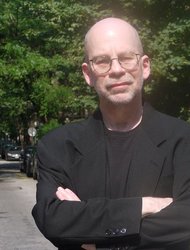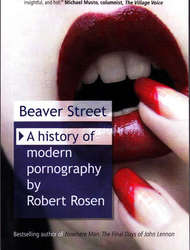Meet Robert Rosen, author of Beaver Street, next week in St. Louis! He’ll be making appearances at Shameless Grounds and Left Bank Books – see the end of this interview for more details!
Q. Many experts such as scientists, journalists and researchers cover what I talk about – sex – in the abstract, and they get respect for it. Meanwhile, I talk about actually DOING the sex and get harshly judged for it. What gives?
A. Let’s start at the beginning: America was built on a foundation of Puritanism, slavery, and genocide. That’s a potent recipe for serious hypocrisy. It’s American exceptionalism at its worst—when it comes to hypocrisy, we’re #1!
You live in a conservative Christian state in a hypocritical, judgmental country. And there is nothing that Americans are more hypocritical and judgmental about than sex. Sex is sin. Sex is the devil’s work. Sex is a river of fire. Sex is for procreation only.
Yet porno is a multi-billion-dollar business. It’s okay to study sex and porn academically—as long as you don’t make it sound like the sinners you’re studying are having fun. And if you’re going to have sex, don’t you dare tell people about it—especially if you’re a woman. And God help you if you publish dirty pictures of yourself. That, I think, is what gives.
Q. Why do people call porn stars porn “stars” but then revile them? Does the word star just mean you starred in a film? Or is it more like movie star, a celebrated figure people admire?
A. You don’t even have to star in a film to be called a porn star. I did one lousy magazine shoot and people called me a porn star. All it takes is one nude picture in a magazine or on the Web and bang—you’re a porn star. If you make a porn video, then you’re a porn superstar. It always seems to come back to the ubiquitous and instantly recognizable Ron Jeremy, who’s become a symbol of the American porn industry. He could walk down Hollywood Boulevard and people would call out to him, “Hey Ron Jeremy, I’ve seen all your films! You’re the greatest porn stud ever!” You’d think he was Robert Redford.
But how many people who watch his videos would want their daughter to go out with him, or would even invite him into their house? Not many, I’d say. ’Cause they think he’s a sleaze, a porn pariah, as you say. He inhabits this weird twilight zone between major celebrity and bad joke. What it comes down to is, if you’re going to work in porn, people are going to find out, and socially you’re going to pay a very high price. You will be an outcast in “polite society.” That’s just the way it is in America and a lot of other places.
Q. What is more magical/irresistible/compelling/sells more – the female form, semen, or big dicks?
A. I’m a man of simple tastes. I like to look at pictures of beautiful naked women, preferably with a well-toned, athletic body, and a nice bush. When I watch porn, I get turned on looking at a man and a woman who are enjoying themselves, experiencing pleasure.
As far as what sells more, each magazine has its own philosophy. The editor at High Society hated big dicks. He thought they were “disgusting.” You’d never see an erect penis in HS. Yet this same editor thought the idea of covering a woman with egg whites and calling the shoot “Sloppy Seconds” was a stroke of genius. Obviously he thought semen was hot. And the magazine sold over 400,000 copies every month in the mid-80s.
So, who knows? Swank was the opposite of High Society, at least when it came to erections. The publisher, Chip Goodman, demanded enormous pictures of fully erect 10-inch dicks, looking as if they were a millisecond from spurting, poised a micrometer from open pussies. And Chip certainly did not go hungry employing this big-dick philosophy.
I left the business just before everything went hardcore, in late 1999. That was when porn publishers decided that penetration and cum shots were going to sell more magazines. The reason they didn’t do it before 1999 was because they didn’t want to be associated with hardcore. But when the Internet took over and the magazine business collapsed, they got desperate. If staying in business meant being a hardcore pornographer, then that’s what they were going to be.
Q. What does your wife think of your career? Does she have a background in porn, too?
A. My wife does not have a background in porn, but she didn’t have a problem with my career. I met her through my officemate, whom I call Henry Dorfman in the book. (I can now say that his real name is Paul Slimak.)
Paul used to work at Screw, so I was not the first pornographer Mary Lyn had ever met. She came with me on some of my European trips, and she met a lot of the photographers, models, photo reps. We socialized with these people. Some of them are still our friends.
At one point I hired her to transcribe interviews with the models. I’m sure Mary Lyn would have preferred I was doing something other than porn. But she understood I was primarily a writer who saw porn as a survival job, a sophisticated alternative to driving a cab or waiting tables. And she acted as my editor as I was writing Beaver Street.
I say in the dedication: “To my wife, Mary Lyn Maiscott, the Mistress of Syntax, who did not divorce me.” But she’s glad I’m out of the biz and that I’ve found some success in my literary endeavors.
Q. Let me get this straight – you filmed porn for years, and then one day you starred in a porn shoot, and you were condemned? What’s up with hypocrisy? It’s bad enough in mainstream society, but does it have to happen in the porn underground, too?
A. Apparently it did have to happen in the porno underground, and I explain why in Beaver Street: I realized that my colleagues were upset not because I’d posed, but because ‘The Five Dollar Blowjob’ had stripped away the comforting anonymity of Swank’s sleaziest stroke book and destroyed the cherished illusion that the people in the magazines were a different species from the people who produced and profited from them. That, apparently, was unforgivable.
My co-workers simply did not understand why an educated, gainfully employed magazine editor would willingly do porno. They thought I’d lost my mind. They didn’t understand that I did it as a journalistic experiment, that I wanted to do something that no real writer had ever done—get in front of the camera and report on what it was like to be a porn star. I became the porn star in their midst, and it made them uncomfortable. After a while, even I began to doubt my motivation. Amazingly, people still bring it up today and it’s been more than 25 years.
Q. How has your book about your career in the porn industry been received?
A. I’m amazed at the reaction Beaver Street has gotten across the cultural spectrum, from highbrow to lowbrow. Vanity Fair, the Erotic Review, Michael Musto of the Village Voice, the academic site H-Net, Bizarre, which is a British mag that proudly describes itself as a sleazeball filth rag, the Sleazoid Podcast, the Seattle Post-Intelligencer—they all like Beaver Street.
I’m grateful for this kind of reception, but I’ve still got a long way to go before I reach the kind of audience I’m hoping to reach. So, look for Beaver Street in the US this week. I’ll be launching the state-side release right here in St. Louis!
————–
Details: At the first event on Tuesday, April 3 at 7 pm, hosted by Hustler model Kendra Holliday at Shameless Grounds, Rosen will focus on the pornographic elements of Beaver Street and discuss his gutsy experiment in participatory journalism—posing for an X-rated photo shoot in order to gain insight into the mind of a porn star.
At the second event on Wednesday, April 4 at 7 pm at Left Bank Books in the Central West End, Rosen will focus on the literary elements of Beaver Street, discussing his journey as a writer that began in his father’s candy store, in Brooklyn, where numerous controversial books were sold, like Tropic of Cancer by Henry Miller, and Last Exit to Brooklyn by Hubert Selby.


Loved the April 3 event! The excerpts read by the author were both hilarious and educational. My fiancee and I eagerly bought the copy of the book.